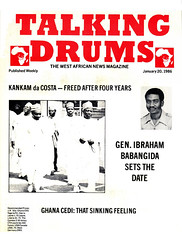Whispering Drums With Maigani
by Musa Ibrahim
The noble profession of arms
He had more interesting things to say about his colleagues and their alleged plot. He described it as "unpatriotic, unmilitary and anti-social conduct by disloyal elements within our ranks against the state, the nation and the military profession."
The President stated that by placing personal desires, personal opinion and personal ambition based purely on self- will above all considerations, the alleged coup plotters had "contemplated and attempted acts whose nature have completely threatened the credibility and honour of the Armed Forces as a national professional force."
The President said that the technical competence and belligerence capability of the nation's armed forces was in no doubt; the problem according to him, is whether the military were not gradually beginning to lose the correct perspectives in relation to their obligation to the state, the nation and to the noble profession of arms.
Major-General Babangida stated that apart from the technical questions to which the military might be asked to contribute solutions, the determination of policy was not their concern.
"Whatever the form and nature or its government at any given time the patriotic soldier owes that nation a duty to submit to the authority of national government, its agencies and representatives," asserted the Major-General.
He stressed that "although the soldier pays taxes and votes, partisan disputes and disagreements must not be his concern, and it was rather the duty of the soldier to sustain the best and noblest virtues and the highest moral values in his society in or out of uniform."
The President said that the military profession was an honourable one, and military men should not associate with crime and criminal persons, corruption, extortion, enrichment and abuse of office, smuggling or drug trafficking, all of which could damage the military profession.
So now everybody knows exactly what 'they' think of 'us'. 'Us' being civilians. If in a country of almost 100 million people, it is only the 145,000 people which con- stitute the Nigerian armed forces that can be counted upon to have high moral virtues then I would beg to submit that even if all 145,000 of them became saints, there would be no salvation for our country.
Obviously, our military people believe that the lowest depths to which a human being can fall is to be civilian. That really should not be surprising because it has happened in Ghana before when the military government then decided to inflict the ultimate punishment on a former military Head of State colleague for all kinds of crime against the state demoted him to the rank of Mister. That was supposed to be a punishment - the same title that the majority of us so very happily call ourselves.
According to Maj-Gen Babangida if his colleagues don't take care they would become no better than civilians with guns i.e. people without any moral integrity. people who steal, who mismanage, who can't run governments, who in short con- stitute all that is wrong in Nigeria.
As if all that were not strange enough, the Major-Gen then went on to admonish his colleagues about their proper role in society. Soldiers, he said, had a duty to submit themselves to the authority of the state, at any given time, no matter what the nature of the government is. In fact, Major-gen Babangida claims that it is not the business of the soldier to determine policy.
If my impertinence would please be excused, I would be tempted to say that with all due respect, such very good advice ought to be directed to the General himself. Somebody might wonder what made their action on December 31, 1983, more patriotic or military. Obviously, if these people too had succeeded, they too would have told us "bloody civilians" that they saw it as their patriotic duty to intervene to save Nigeria from a terrible fate.
The point being that the soldiers will either have to accept that it is none of their business to intervene in the political process at any time unless there is no demo- cratic avenue for change and military acts only as part of the civilian population.
Obviously, there is nothing wrong with any professional group taking pride in its profession, but when it gets to the point where the members begin to believe that they have moral virtues to the exclusion of all other professions and groups when they form such a miniscule section of society then there is something very wrong, especially when there are other professions in the society who can rightly claim to be of more use to the people than the military. There are other people who might say that the "technical competence and belligerence capability of the nation's armed forces" cannot be said to be in doubt.
The Nigerian soldier, and for that matter most of the soldiers in Third World countries, have spent so much time trying to do things for which they have absolutely no training and in which they have no aptitude that there can be no certainty that they still remember their original training.
By all means our soldiers should feel proud of their profession, they can even believe that theirs alone is a noble pro- fession, but unless they accept that the civilian population is as virtuous, has as much integrity, is a disciplined (without drill masters) and as competent, there will always be a terrible misunderstanding which will not help the nation.
For from the other side of the town we "bloody civilians" (as they call us) also see the military in not so very complimentary terms.
